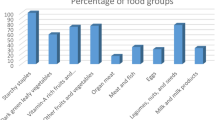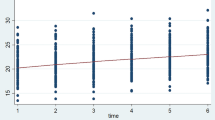Abstract
Objective: To evaluate nutritional status and dietary intakes in HIV-outpatients in Abidjan, Côte d’Ivoire.
Design: Cross-sectional study.
Setting: In the Outpatients and Counselling Unit in the University Hospital in Treichville, and in the follow-up Unit of Blood Donors.
Subjects: 100 HIV-infected patients at different stages of the infection recruited consecutively in the two consultation services. Main outcome measures: Clinical, biological and anthropometric data were collected: weight, baseline weight, height, triceps skinfold (TS), arm circumference (AC), body mass index (BMI), muscular circumference (MC) and weight loss (WL). Dietary intake was estimated by the 24 h recall method.
Results: The M:F sex ratio was 1.1:1. Mean age was 32.5 y (30.7–34.4); 64% of the patients were symptomatic (S+). Mean weight was 58.7 kg (56.8–60.6) and mean BMI, 20.9 k/m2 (20.7–21.1); 67% of the patients had a BMI<21.5 kg/m2. S+ patients had mean weight, BMI, AC and MC significantly lower than asymptomatic patients (P<0.0001=0.001, 0.0003 and 0.004 respectively) and had suffered a more important WL (P<0.0001). Immunodepressed patients had mean weight, AC and MC significantly lower than patients with a CD4 count≥200/mm3 (P=0.04, 0.005 and 0.04 respectively). WL was independent of CD4 count. Protein, carbohydrate and fat intakes were respectively 59 g/24 h (52–66), 266 g/24 h (240–292) and 59 g/24 h (51–66). Energy mean intake was 7.6 MJ/24 h (6.9–8.4) and lower than WHO recommended intakes.
Conclusions: In Abidjan, anthropometric parameters and dietary intakes of HIV-infected patients are worsened by clinical events. Nutritional intakes are generally lower than recommendations. Further studies are needed to determine if, in the African context, a causal relationship could exist between dietary intakes and nutritional status in HIV-infected patients.
Sponsorship: This study has been presented in part at the IXth International Conference on AIDS and STD in Africa, Kampala, Ouganda, December 10–14, 1995 (Abstract no. Tu B123), and was supported in part by the Université de Bordeaux II, Bordeaux (France) and the Centre ORSTOM Petit-Bassam, Abidjan, Côte d’Ivoire.
This is a preview of subscription content, access via your institution
Access options
Subscribe to this journal
Receive 12 print issues and online access
$259.00 per year
only $21.58 per issue
Buy this article
- Purchase on Springer Link
- Instant access to full article PDF
Prices may be subject to local taxes which are calculated during checkout
Similar content being viewed by others
Author information
Authors and Affiliations
Rights and permissions
About this article
Cite this article
Castetbon, K., Kadio, A., Bondurand, A. et al. Nutritional status and dietary intakes in human immunodeficiency virus (HIV)-infected outpatients in Abidjan, Côte D’Ivoire, 1995. Eur J Clin Nutr 51, 81–86 (1997). https://doi.org/10.1038/sj.ejcn.1600365
Received:
Revised:
Accepted:
Issue Date:
DOI: https://doi.org/10.1038/sj.ejcn.1600365
Keywords
This article is cited by
-
Effects of an HIV-Care-Program on immunological parameters in HIV-positive patients in Yaoundé, Cameroon: a cluster-randomized trial
International Journal of Public Health (2014)
-
Reliability of anthropometric measures in a longitudinal cohort of patients initiating ART in West Africa
BMC Medical Research Methodology (2010)
-
Systemic levels of carotenoids from mangoes and papaya consumed in three forms (juice, fresh and dry slice)
European Journal of Clinical Nutrition (2007)



